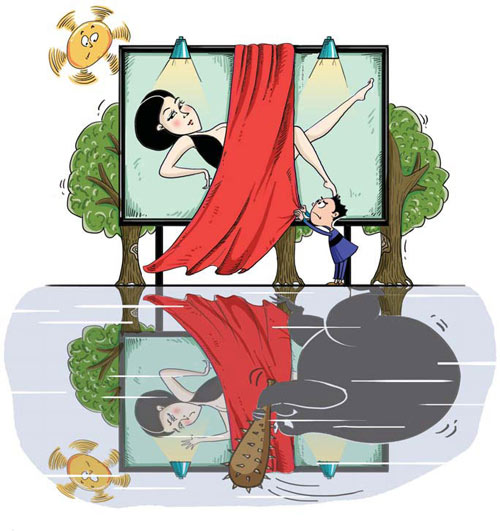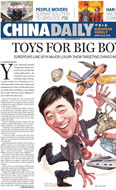The ills of blind pursuit of pleasure
Updated: 2011-04-15 11:14
By Chung-yue Chang (China Daily European Weekly)
|

|
A recent news report on outdoor advertising in Beijing made interesting reading. The Beijing municipal administration for industry and commerce recently posted an announcement on its website, asking outdoor advertisers to self-evaluate and rectify by April 15 advertisements that are against regulations. It also asked advertisers to avoid ads that are in "poor taste", refer to "imperial-aristocratic elitism" and promote "hedonism and worship of things foreign".
The administration's goal is to create a "fair and harmonious" environment and beautify Beijing. Though it is a routine municipal measure, the reference to "hedonism" points to a larger issue: The status, nature and meaning of luxury goods in China.
Let us talk about the status first. Many billboards in Beijing and other major Chinese cities advertise foreign luxury goods. The Chinese luxury market is growing at an average annual rate of 20 percent. By 2015, China is expected to surpass Japan as the world's largest luxury market.
The issue of "hedonism" has been widely reported in Western business and trade media. Interestingly, the general tone of some of these reports conveys a hidden hostility toward China.
A Bloomberg News report on March 23 (Beijing Bans Outdoor Advertising Promoting 'Hedonism' as Wealth Gap Widens) is a case in point. It says Louis Vuitton, Hermes and Prada are expanding in China in a major way. The news was preceded by a negative subliminal portrayal of China, suggesting dysfunction and trouble. One is puzzled by the incongruity between this negative portrayal and the energized commercial activity of foreign luxury goods makers in China.
This subtle portrayal, like most advertisements, works subliminally. Factually true but otherwise unflattering "statements" about China are spread strategically in news reports. Yet collectively these statements elicit, by sublimation, negative overall impressions. The separate "statements" in the Bloomberg report are rearranged below to show the negative impressions.
The article made a fuss about the campaign, assuming that the announcement's hidden intention was to maintain stability in China by minimizing the causes for general dissatisfaction which could lead to a situation similar to that in the Middle East and North Africa.
Sadly, this kind of hostile positioning of China, by sophisticated subliminal means, is a common media practice in the West. It is not healthy, nor does it serve anyone well.
Next, let us see what is the nature of luxury goods and what do they mean for China. Luxury goods are not necessities, people enjoy them to smoothen the roughness of life. But excess use of luxury goods can bring ruin to many. China has produced, exported, imported and consumed luxury goods throughout its long history, except for maybe three decades. Historians have long debated whether the love for Chinese silk contributed to the fall of the Roman Empire. In short, luxury goods are not new to China.
But apart from the revival of traditional domestic goods, there is now a strong demand for foreign goods - fast cars, jewelry, expensive watches, designer clothes, vintage wines, and even luxury yachts and private jets.
If luxury goods do smoothen the harshness of life, why should the Beijing administration even talk about "hedonism"? One possible answer is: Hedonism leads to excessive consumption of luxury goods, and, worst, it leads to the glorification of such excess.
Today, many from among the Chinese nouveau riche indulge in excesses. To give one example, a rich Chinese in Qingdao, Shandong province, hired some people on March 15 to destroy his Lamborghini Gallardo L140 luxury sports car in public to mark the World Consumer Rights Day. The destruction of the luxury car, worth about $260,000 (179,374 euros), was apparently an "act of protest for shoddy Lamborghini repair services". Or was it an act of self-promotion? This mindless destruction is an apt example of the glorification of excessive consumption of luxury goods.
Such a glorification has two drawbacks. First, it could create an unhealthy over-confident mentality among the rich and an unhealthy under-confident mindset among the poor. This polarization was not part of China's economic reform. Over the past 30 years, some people have indeed, according to plan, become rich first. The next 30 years, again according to plan, should be the time for the rest of the population to catch up. In fact, this is the goal of China's 12th Five-Year Plan (2011-2015), too.
The second drawback is that glorification of excess is contrary to every aspect of Chinese culture. Citing one such aspect here would suffice. Excessive consumption leads to waste of resources, which is contrary to the laws of nature. And anything that goes against nature is contrary to Chinese values, which are thoroughly ecological. It is in this sense that the recent wanton destruction of the Lamborghini is an extreme act of waste. This should more than help one to see the true meaning of the Beijing administration's move against "hedonism".
The Beijing administration's announcement reflects the key functions of Chinese governance, which include dissemination and promotion of values. China is not merely a socio-politico-economic entity. It is first a distinct cultural entity. In this respect, one only wishes that the Western media can stay away from its own myopic perspective about China and develops its capacity to know China on its own terms.
The author teaches philosophy in the United States.
E-paper

Han me downs
Traditional 3,000-year-old clothes are making a comeback.
Reaching out
Fast growth fuels rise in super rich
Chinese tourists spend more
Specials

Big spenders
More mainland tourists are expected to spend money on overseas travel this year.

Rise in super rich
Report cites rising property prices, gdp as key drivers of increasing number of chinese millionaires.

Reaching out
Condom makers are stepping up their presence in smaller cities to boost sales
